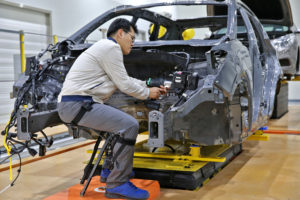Hyundai Motor Group has ventured further into the high-value robotics industry of the future by commencing development of Hyundai Vest Exoskeleton (H-VEX) wearable industrial robots. Following the Hyundai Chairless Exoskeleton (H-CEX) demonstration conducted in the Hyundai-KIA North American factory last August, the company plans to verify H-VEX’s success through extensive testing at the end of 2018.
In early 2018, Hyundai selected Robot-Artificial Intelligence as one of five areas of future innovation growth. The company established a designated robotics team in its strategic technology headquarters to focus on the development of related tech, and is expanding its cooperation with associated sectors.
“The robotics field not only offers future mobility solutions, but also presents alternative solutions to reduce productivity decline in the workforce. Hyundai plans to utilize its extensive technological database collected from autonomous vehicle production experience to drive the company’s success in the robotics field,” said Dr. Youngcho Chi, executive vice president of Strategy & Technology Division and chief innovation officer.
Hyundai is developing technology in three areas of robotics: wearable robots, service robots, and micro-mobility. The company is also in the process of strategic cooperation with promising domestic and international companies that possess robotic and artificial intelligence technology.

The first H-CEX, developed for industrial use, is a knee joint protective device that helps maintain the worker’s sitting position. At 1.6kg it is light, yet highly durable and can withstand weights of up to 150kg. With waist, thigh and knee belts it can be easily equipped and adjusted to the user’s height. It also features three different angle settings (85/70/55).
Along with the H-CEX, Hyundai plans to test and apply the H-VEX in the North American factories at the end of the year. H-VEX is a device that alleviates pressure on the workers’ neck and back by adding 60kg of strength to the user when their arms are used overhead. It is expected to be very effective at preventing injury and increasing work efficiency.
There are a variety of applications and fields that robots can be developed for, such as wearables, service robots, micro mobility, etc. Hyundai showcased Hyundai Medical Exoskeleton (H-MEX) at the 2017 International Consumer Electronics Show (CES). H-MEX assists paraplegics and elderly people with walking and traversing staircases. It is currently in the process of being approved by the Ministry of Food and Drug Safety in Korea and the U.S. Food and Drug Administration for commercialization as a medical device.
Another Hyundai Motor Group development in robotics, the Hyundai Universal Medical Assist (HUMA), can be applied to the waist and legs to strengthen the muscles while walking, enabling users to achieve a running speed of 12km/h and making it one of the fastest wearable robots in the world.
Other than wearables, various robots that can improve the quality of a user’s life will be introduced in the future. These include a ‘Hotel Service Robot’ that can take care of room service and guide guests around a hotel; a ‘Sales Service Robot’ that can explain car details to customers in retailers; an ‘Electric Vehicle Charge Manipulator’ that automatically charges an electric vehicle when stopped in front of it; and a next-generation ‘robotic personal mobility’ solution, a single mobility platform so versatile that it can slowly traverse with two wheels and change into a three-wheel based transport for improved stability.
Hyundai Motor Group has made investments in the robotics field, including establishing a $4.5 million ‘AI Alliance Fund’, created in cooperation with SK Telecom and Hanwha Asset Management Co. Ltd to invest in promising startups with competence in artificial intelligence and smart mobility.
Hyundai also initiated a strategic investments in the US-based artificial intelligence technology startup Perceptive Automata to secure a human movement prediction technology, and is cooperating with China’s top vision technology equipped artificial intelligence startup DeepGlint.
Source Hyundai Motor Group
Was this article valuable?
Here are more articles you may enjoy.

 FM Using AI to Elevate Claims to Deliver More Than Just Cost Savings
FM Using AI to Elevate Claims to Deliver More Than Just Cost Savings  Hackers Hit Sensitive Targets in 37 Nations in Spying Plot
Hackers Hit Sensitive Targets in 37 Nations in Spying Plot  Why 2026 Is The Tipping Point for The Evolving Role of AI in Law and Claims
Why 2026 Is The Tipping Point for The Evolving Role of AI in Law and Claims  Tesla Sued Over Crash That Trapped, Killed Massachusetts Driver
Tesla Sued Over Crash That Trapped, Killed Massachusetts Driver 